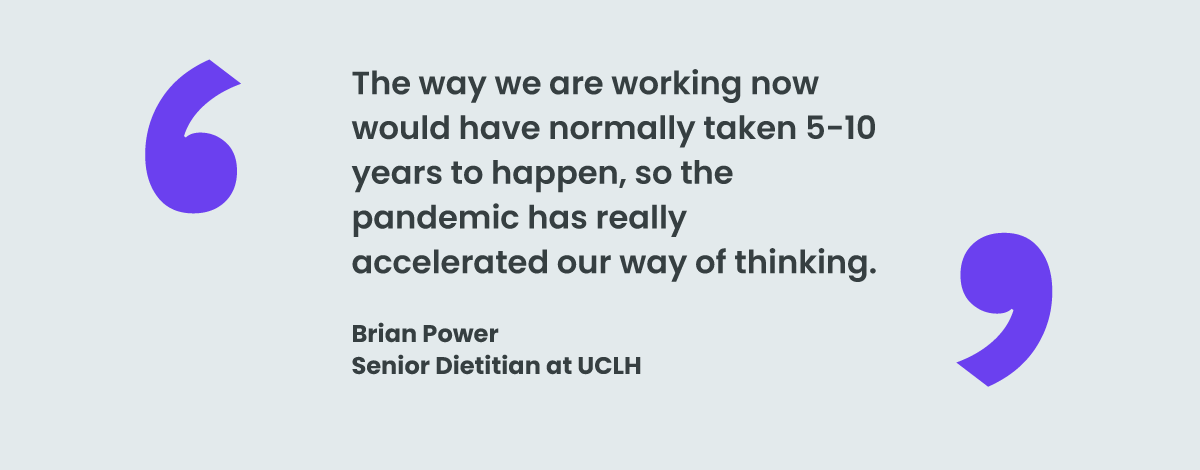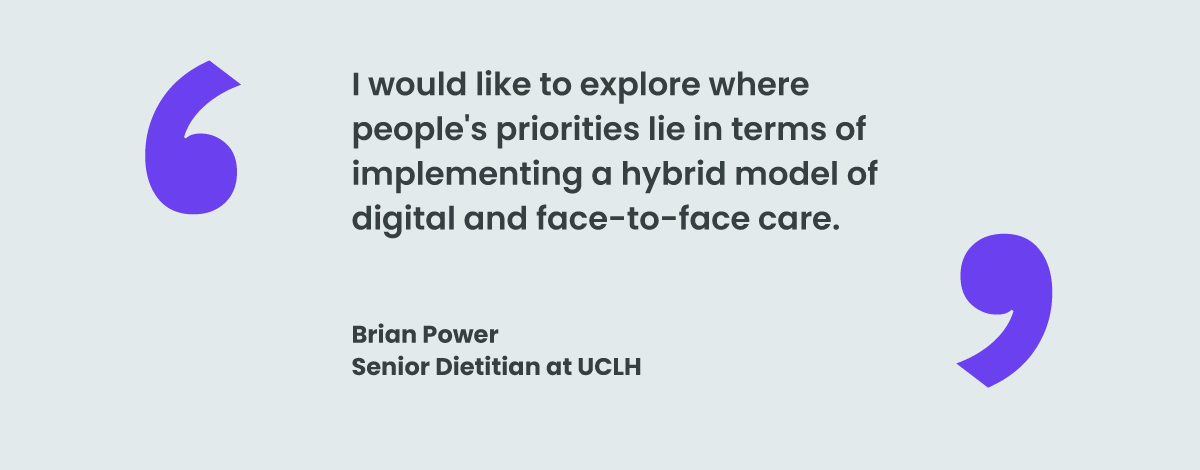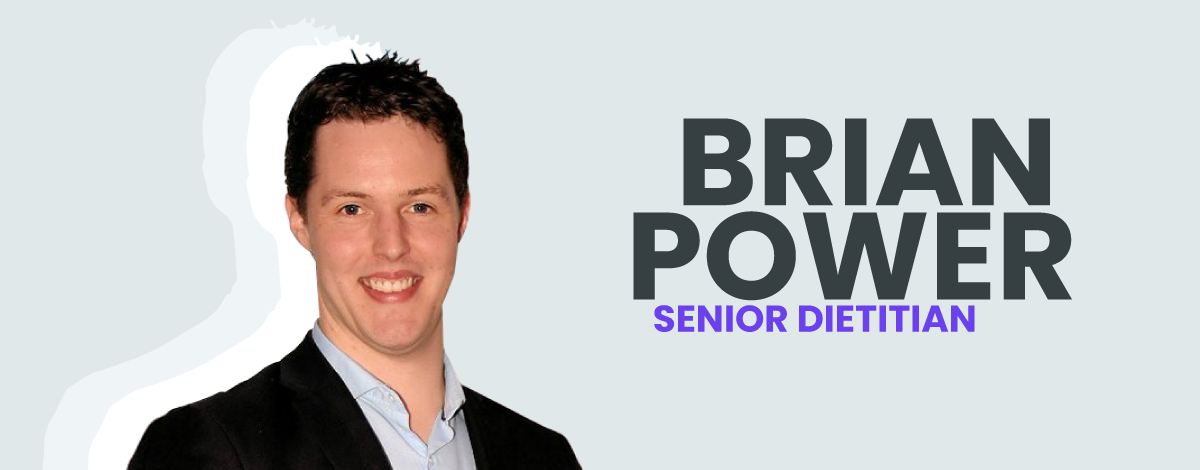Reflections with Julia: ‘This is our opportunity for lasting positive change’
14 May 2021Interview
In this interview, we speak to Brian Power, honorary Senior Dietitian at University College London Hospitals (UCLH). Brian lectures at the Institute of Technology Sligo in Ireland and is a Director of the British Dietetic Association (BDA) Council. He currently sits on the European Federation of the Association of Dietitians (EFAD) Research and Evidence Based Practice Committee.
Having also become a dad for the first time in May 2020, Brian shares his personal experience of working through the pandemic and his plans to explore the lasting behavioural and practical changes that will arise from it.
Julia: What changed for you when the pandemic hit?
Brian: “Things went very quickly from ‘We need to talk about COVID’ to ‘Everyone go home and work from there’. It was emergency mode. As my primary role is lecturing, it was a case of ensuring that all our students had access to everything they needed. This wasn’t too difficult as I had been doing some virtual teaching anyway. Patient-wise, the majority of consultations went online including all pre- and post-surgery dietetic reviews.
“For me personally, and certainly before the severity of the pandemic really became clear, I was excited about the new way of working. I’ve always been an advocate for behaviour change and questioned the need for so many face-to-face meetings, for example. So I felt very positive about us having to do things differently.”
What were the biggest challenges you faced?
Balancing work and family life
“The biggest challenge for me was disentangling my work from my new daddy life whilst working from home. When my son’s calling ‘Dadda’ from the other room, it’s hard to ignore it. In fact just before I came on to this interview he knocked my laptop onto the floor!
“It’s actually more about people’s expectations of what you can achieve at home. Because you don’t have the commute, I think it’s assumed by some that you’ll work longer and get more done. For me, I’ve just been trying to strike the right balance and, because I’ve been able to spend more time looking after my son, I wouldn’t change a thing. Being a dad has increased my understanding of family life and the challenges that come with it. So I now have more empathy for other co-workers and patients, which in turn has made me a better dietitian.”
Zoom fatigue
“I think my students have become exhausted by the experience of having all their lectures online. They may have up to 25 online lectures a week, and whilst they don’t mind this per se, this is not being offset by the social aspect which is obviously a huge part of university life. As a result, it's been really hard to retain their engagement.”
Lack of face-to-face contact with patients
“For some patients, holding remote consultations has actually been a good thing, as it’s meant that they haven't had to travel long distances. However because some of the scenarios are highly emotive, for example in giving a diagnosis, it can be very difficult not being able to give that face-to-face reassurance. Many patients may not have the technological infrastructure or resources needed for the remote consultation. I’m now far more aware of these and other non-clinical considerations that come with a patient attending an appointment.”

Have some elements of your practice changed for good?
“The way we are working now would have normally taken 5-10 years to happen, so the pandemic has really accelerated our way of thinking.
“In my research role, I look at how new ways of working can be implemented across the health service. I’m excited to find out people’s arguments for and against going back to the old ways.
“The mindset has very much been that what is happening now is temporary, but I would like to explore where people's priorities lie in terms of implementing a hybrid model of digital and face-to-face care. As part of this, I will be looking at what digital ways of working have been implemented in dietetics across Europe and what we can learn from these.
“There is also an interesting research question around taking student placements online. Is it possible to learn the same skills online as you would face to face, and therefore do you actually need to see a patient in person before you qualify?
“If you offered a 12-week placement online, it would provide an opportunity to assess a student's digital competencies. They could also potentially gain more communication skills as a result of not being able to rely on body language and positioning.
“Personally, I think it would be partly role dependent. With acute care, it’s not just about how students are with patients, but also how they hold up working in a hospital environment. Furthermore, learning skills such as tube feeding obviously requires some patient interaction.
In my experience, the success of digital versus face-to-face care will ultimately be dependent on the patient. Even if the evidence says that seeing someone face to face won’t make a difference to the patient's outcome, if their perception is that it will be more beneficial, then we should respect their decision.”

What are the most important lessons you've learned in recent months?
“Mike Ryan, Executive Director of the World Health Organisation, described the biggest lesson in emergency response as ‘perfection is the enemy of the good’.
“You don’t need to have a full planning phase and protocols in place before acting. Instead you can do a quick weigh up of the pros and cons, act, and then refine as you go. We’ve been thrown into this experiment and so it’s important we keep evaluating how we’re doing. And whilst issues may build up and cause people to catastrophize, making just small tweaks can often make a big difference.
“The speed of our COVID-19 vaccination programme has shown that it is possible to reduce the layers of bureaucracy. Rather than taking a year to prepare to do a study, we can reduce this to 2-3 months.
“I really hope we can capitalise on all the learning we have gone through, the positive and the negative, and don’t become blinded by preconceived notions of what’s right and wrong.
“This is our opportunity for lasting positive change.”
What CPD have you been accessing during this time?
“I’ve been attending more webinars and digital conferences. With people not having to travel to events, the cost in terms of time, expenditure, and environmental impact have all been reduced. This has therefore been a real opportunity, with learning more accessible for people at all job levels.
“For example, there was a digital masterclass in dietary assessment methods run by Imperial College London. Previously, you would have had to go to the College for this but, because of the pandemic, they repurposed it online.
“I have also been able to work more on my digital competencies, with time to reflect on what areas of digital I have been proficient in and what I need to be more aware of.”
What are your hopes for the future?
“I hope to develop my own website that will offer a mixture of live and recorded training sessions around behavioural change approaches.
“I have gained a lot of experience over the last 5-6 years and I feel like now is the time to share that knowledge. I’ve been wanting to do this for a while, but haven’t quite had the courage or resilience. I previously had a very set vision of what needed to happen: I would write about a certain number of topics before launch, or carry out certain pieces of research. But if this period has taught me anything, it’s to just do it!”
A huge thank you to Brian for taking the time to reflect with us on his experience. If you found this article useful or inspiring, we would be so grateful if you could share it on Twitter.
Julia helps you record, reflect, and report on your CPD through our website and app.
It's an easy way for you to stay on top of your CPD. Sign up for a 14 day free today.
